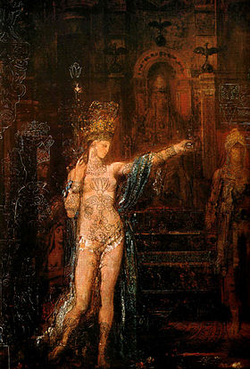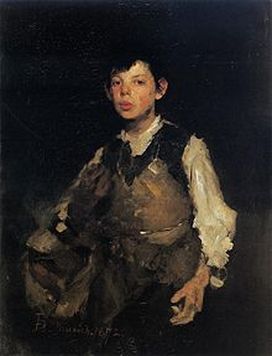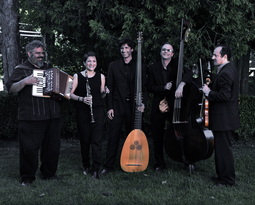Before I tell you what it was, let me preface it by saying that I'm someone who loves to whistle. For that reason, I found the information that I stumbled across not only surprising, but also rather distressing. The topic was Jews and Whistling, and what I learned was this: Jews are not supposed to whistle.
Surprising … distressing … but the information comes from an absolutely unimpeachable source: a song, by the name of "Reyzele." If you don't know it, here it is, as sung by Moshe Leiser:
| |
"Davey," she says, "you gotta cut out the whistling. Every time you come around doing that, my mom says, 'Listen, there he goes again with the whistling.' She's strict, Davey. She doesn't like it. 'Whistling,' she says, 'isn't Jewish. It's for those other people.'"
Naturally, since this is a love song, this is David's response:
"For you, Rosie, I'll stop with the whistling. And that's not all. I'm even gonna start going to shul every Shabbes and become pious ... just like your mom."
| Now, "Reyzele" is a song I've played and loved since I was a kid.* Until recently, I had never paid attention to the words.** I didn't know about the whistling element. And I hadn't heard anywhere else that Jews and whistling don't mix. But I meant it when I said the source was unimpeachable. "Reyzele" was written by Mordecai Gebirtig, a composer whose compositions felt so authentic to the Jewish public of his time that they attained the status of folksong. Given Gebirtig's stature, we can take it as true, at least for some places and times, that this no-whistling thing is a real thing. | *Not only that. My band, Big Galut(e), just recorded it for our first album. (Coming Soon) We decided, just to be wise guys (and gal), to include a little whistling section in the song. |
| Okay, it's a real thing. So what are we to make of that? On the one hand, whistling, love it or hate it, is not profound or important, is barely worthy of mention, when you compare it with such matters as, for example, the female and male beauty ideals. On the other hand ... a really vivid picture of the nineteenth-century Jewish world ought to include some of life's smaller and sillier details. And it turns out, when we start adding up those silly details--yes, there are some others--we end up actually touching on profundities. We get an idea of how even minor differences between people are crucial in forming their identities … and an idea of the power of conformity in some of those communities, as it extends even to silly details. What other silly details do I have in mind? Here's historian Yaffa Eliach, telling one of the countless wonderful stories that fill There Once Was A World, her monumental portrait of the shtetl Eishyshok, in what is now Lithuania: "Though vegetable gardens were common, flower gardens were very rare. People might grow sunflowers and poppies for their seeds, but except for Hayya Sonenson and the Tzimbalist family, Jews in Eishyshok did not grow flowers. In fact, until after World War I, growing flowers was considered "un-Jewish," in the same way that owning a dog was. "One family who briefly deviated from the general pattern soon reverted to tradition–to the distress of their children, as Meir Wilkanski recounted in his memoir. Sometime in the 1880s the Wilkanski children planted the seeds of sweet peas and other flowers that had been sent to them by a relative in the countryside. The flower garden in their front yard was very successful. All the seeds blossomed, and sweet pea vines climbed the house, covering it with a dazzling array of flowers which delighted the children. Their parents, too, were proud, until the day Reb Layzer overheard a Jewish beggar standing before his house debating in a loud monologue whether to enter it and ask for alms. Deciding on the basis of its flowers that it must be the house of a gentile, he passed it by. Reb Layzer promptly went out to the garden and uprooted all his children's beautiful flowers, whereupon the children, fighting back their tears, vowed to have a beautiful flower garden as soon as the family emigrated to the Land of Israel, where, they felt sure, it would be proper for a Jew to grow flowers."  Me, I would probably have been okay with letting the beggar go on by, whatever the reason. But, as I said … I love to whistle, too. | **I included Moshe Leiser's version of Reyzele for a reason. It wasn't until I heard it that I ever paid attention to the words. I think it was the great surprise of finding his recording that made me pay attention, as if I were hearing a song I hadn't heard before. Who's Moshe Leiser? Let me answer with a story of how two of my worlds collided: When I was twenty-one, I got very lucky. I traveled to Italy, to the town of Spoleto, for the first of several stints playing violin at the big arts festival there, the Festival dei Due Mondi--the Spoleto Festival, for short. It was a summer spent drinking in the many pleasures of Italy (and eating some of them) with nighttime visits to Spoleto's Roman aqueduct (where we stayed out till all hours) ... morning dashes to the cafe to guzzle a cappuccino minutes before rehearsal … longer-distance dashes to Rome and Florence on days off ... nap-time attempts at avoiding Signora Luna, our terrifying old landlady … and all through the day, and through the summer, a lot of opera playing.  Salome, by Gustave Moreau Salome, by Gustave Moreau The big opera at the festival that summer was Richard Strauss' Salome, and playing it required wresting concentration from all of Italy's delights and wonders, and keeping it squarely in the opera pit. In the first place, if you've never had the pleasure of playing a Strauss opera … Strauss gives the orchestra musicians a lot of notes to play, and not a lot of time in which to play them. Our conductor, the late Spiros Argiris, was impossibly intense, constantly demanding (and also, totally inspiring and truly beloved by his troops.) Then there were those incredible sounds drifting down into the pit from the stage, which you needed to listen to, without forgetting about that impossible run of notes coming up on the page in front of you … With attention on these other things, I was only vaguely aware of the pair of Frenchmen who, all through the rehearsal process, could be seen patrolling the aisles of the theater. These were the directors of the production, Moshe and Patrice. I remember that they seemed young, slim I think, and very French. I knew for some reason that they did a lot of directing as a team. As will happen with these things, their names got stuck in my brain in the general compartment labelled "Opera World." For years afterward, I probably didn't give them a single thought. It was thus with nothing less than astonishment that, one day not so long ago, I stumbled across an album of Yiddish songs, really beautiful renditions, some of the warmest and most intimate I'd heard, in fact, recorded by none other than Moshe. He made this recording just a few years before that production of Salome. I never would have guessed. |


 RSS Feed
RSS Feed